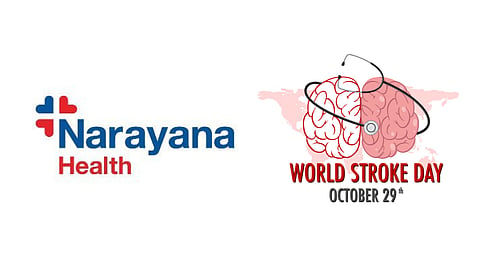

Stroke remains one of the leading causes of death and disability worldwide. Timely intervention is critical not only to save lives but also to minimize long-term complications. On the occasion of World Stroke Day 2025, themed “Every Minute Counts,” Narayana Hospital, Ahmedabad, highlights how rapid response, advanced diagnostics, and multidisciplinary expertise are transforming stroke outcomes.
According to global estimates, more than 12 million people experience a first-time stroke each year. In India, the burden continues to rise due to hypertension, diabetes, and sedentary lifestyles. Yet, experts emphasize that up to 80% of strokes are preventable through awareness, risk-factor control, and prompt medical intervention.
The Golden Hour: Early Recognition Saves Time and Function
The concept of the golden hour—the first 60 minutes after stroke onset—is crucial in stroke care. Immediate intervention during this window can significantly improve the recovery process and reduce the risk of long-term or permanent damage. Recognising the signs early and initiating medical help immediately are critical to preserving brain function—because every second counts.
To identify symptoms efficiently and quickly, clinicians use the acronym FAST, which stands for:
Face drooping
Arm weakness
Speech difficulty
Time to call emergency services like 108
Dr. Rakhil Yadav, Consultant Neurologist at Narayana Hospital, Rakhial, Ahmedabad, emphasizes: “Most patients and families squander precious time debating if symptoms are 'serious enough.' When speech slurs, the face droops, or one side weakens, treat it as a stroke until proven otherwise. In my practice, I have seen patients regain full function because a family member knew FAST and dialed 108 within minutes. Quick action limits brain damage and dramatically improves recovery odds. Waiting to see if it passes is where too many outcomes are lost.”
A Rare Case Study and Success Story
Recently, a 40-year-old corporate professional experienced a sudden stroke during one of his routine meetings in the office. As the patient arrived at Narayana Hospital, Ahmedabad, he was treated by Dr. Rakhil Yadav, and his thrombectomy, guided by AI imaging, restored speech and mobility within hours. Today, the patient is not just surviving, but thriving—standing as a strong testament to seamless, advanced, and round-the-clock preparedness.
Interventional Management and Advanced Solutions
In recent years, stroke treatment has benefited from cutting-edge interventional methods such as mechanical thrombectomy, endovascular procedures, and minimally invasive neurosurgery. These approaches, when initiated promptly by experienced specialists, can rapidly restore circulation, limit the affected brain area, and improve functional recovery.
Newer imaging tools now allow doctors to evaluate brain tissue quickly and identify which areas can still be saved—helping specialists make faster, more accurate treatment decisions.
Round-the-Clock Multidisciplinary Expertise at Narayana Health
A multidisciplinary approach is one of the most effective ways to manage and recover from stroke. At Narayana Hospital, Ahmedabad, a dedicated team comprising radiologists, neurosurgeons, critical care specialists, and rehabilitation therapists remains on standby 24x7 to treat stroke emergencies.
Such coordinated and collaborative treatment ensures rapid assessment and timely intervention—crucial factors that significantly improve survival rates and long-term outcomes.
The Road to Recovery
Rehabilitation is an integral part of stroke treatment. Early physiotherapy, speech therapy, occupational therapy, and consistent medical support help patients regain independence and quality of life. While rapid response minimizes damage, a structured rehabilitation programme maximizes recovery and reduces the risk of long-term disability.
Dr. Kamal Nagar, Consultant Neurologist at Narayana Hospital, Rakhial, Ahmedabad, shares: “Stroke survivors rebuild strength and speech through disciplined rehab, but the path demands consistency. Small wins compound over weeks into profound change. Families fuel this by championing therapy, fostering mobility, and nurturing positivity. It is not just physical; it is an emotional, social, and profoundly personal odyssey.”
Awareness: The First Line of Defence
Advanced treatments can, no doubt, save lives—but awareness and early response remain the first line of defence against stroke. Recognizing the warning signs and seeking emergency medical help without delay ensures patients reach hospitals in time for effective intervention.
This World Stroke Day, let us commit to learning how to recognize the early symptoms of stroke and support better access to expert treatment—so that every patient has the best chance to recover, rebuild, and live fully once again.
Please Note:
These insights are for informational purposes only. Please consult your doctor for advice on any medical condition or vaccination.